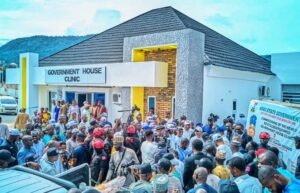

By Dada Ahmed/Abah Benjamin Eneojoh.

When Governor Ahmed Usman Ododo announced a monthly incentive of N300,000 for medical doctors in the Kogi State civil service, the hall erupted in applause. For many, the decision signaled more than just a pay boost; it was a lifeline for the state’s fragile healthcare system and a decisive step against the “Japa syndrome” that has drained hospitals of skilled hands.
For years, Nigeria’s health sector has battled an exodus of doctors, nurses, and specialists seeking greener pastures abroad. Kogi, like many states, has been at the receiving end, with overstretched facilities and communities left underserved. The governor’s new intervention seeks to change that narrative by making medical practice in the state more rewarding and sustainable.
The announcement came during the official flag-off of access-to-care coverage for over 76,000 residents under the Kogi State Health Insurance Scheme. Standing at the podium, Governor Ododo made it clear: retaining healthcare workers is as crucial as providing free access to healthcare itself.
The N300,000 monthly incentive is not just about boosting income; it is about restoring dignity to the medical profession in the state. By aligning pay with the weight of responsibility doctors carry, the government hopes to renew confidence and discourage the urge to migrate abroad.
Health sector analysts argue that money alone cannot solve the Japa crisis, but in a country where doctors are paid a fraction of what they earn overseas, the incentive narrows the gap. It also demonstrates political will, a factor many professionals say influences their decision to stay or leave.
The governor’s intervention is part of a broader package. Alongside the doctor’s incentive, Ododo launched a free healthcare insurance scheme covering pensioners, local government workers, and students. Specifically, 28,056 local government civil servants, 3,429 pensioners, and 44,760 students under the TISHIP program will benefit.
For pensioners, the relief could not have come at a better time. The Director-General of the Kogi Pension Commission, Hajia Maryam Abedo, described the gesture as “unprecedented.” For elderly retirees often burdened by high medical bills, access to free healthcare means peace of mind and restored dignity in old age.
Development partners, including the World Health Organization (WHO), were quick to commend the initiative. Representatives at the launch said Kogi’s enabling environment has opened new doors for collaboration in improving health delivery. “This is the kind of leadership that makes impact,” one WHO official noted.
Beyond the applause, the deeper question is how these interventions will translate to real change. Experts say retaining doctors will mean shorter patient queues, reduced burnout for medical personnel, and better-quality care. For rural communities, it could mean finally having a resident doctor rather than depending on occasional outreach visits.
The incentive also carries symbolic weight. By prioritizing healthcare workers, the Ododo administration is signaling a shift in policy thinking, from reactive to proactive governance. Instead of merely lamenting brain drain, the state is offering practical solutions to make staying attractive.
Critically, the move could inspire other states to replicate the model. If sustained, Kogi may soon become a reference point in the national conversation on how to stem the exodus of health workers. Already, stakeholders say the package is one of the most ambitious incentives in recent memory.
Doctors in the state are equally optimistic. “This is the first time in my 15 years of practice here that I feel genuinely valued,” .“It’s not just the money, it’s the recognition that our work matters,”said a consultant at the Specialist Hospital, Lokoja who would not want his name mentioned.
For Governor Ododo, the stakes are high. The N300,000 intervention is both a promise and a test,a promise to the people that healthcare will improve, and a test of his administration’s resolve to fund and sustain the programme, despite economic pressures.
Ultimately, the success of the initiative will be measured not only in numbers but in lives saved, communities served, and the morale of a once-weary workforce. If sustained, the intervention may well become Ododo’s defining legacy, the moment Kogi began to reverse the tide of Japa and chart a new course for healthcare delivery.
In the meantime, hope has returned. Doctors are smiling again, pensioners breathe a sigh of relief, and ordinary citizens look forward to a future where healthcare is no longer a luxury but a right, guaranteed by a government that dares to dream big.
Ahmed publishes The Reporters while Eneojoh reports Government House activities.


